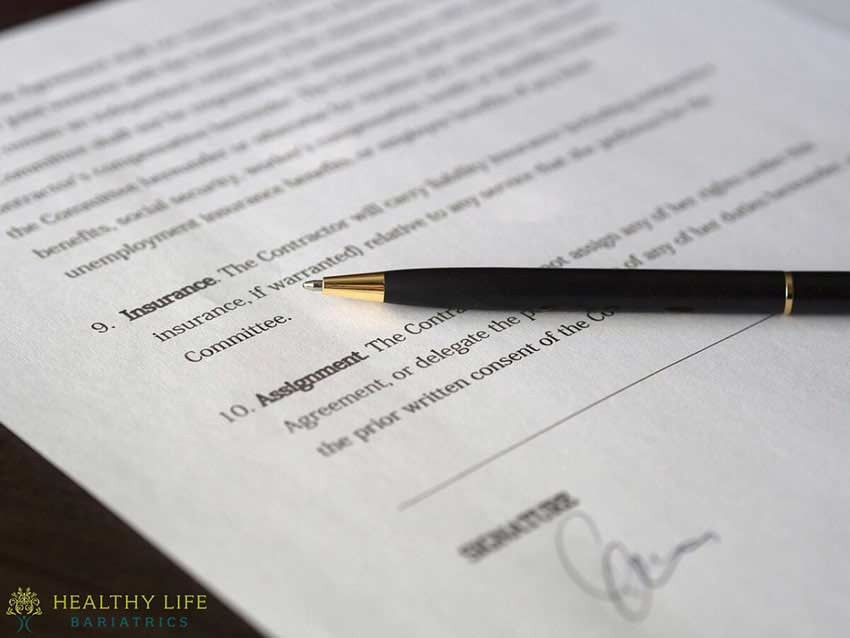
For Bariatric Surgery, A Letter of Medical Necessity (LOMN) is a document that tells health insurance companies that a medical procedure is needed to preserve your life.
When that medical procedure is bariatric surgery, health insurers want a LOMN written by your doctor. This letter lets them know you’ve tried every diet and fitness program to lose weight in the past but to no avail.
You may have questions about how they write a letter of necessity, who writes it, and how to get one. The information that follows will help you learn more about this document. Most if not all insurance providers out there require this letter. We’ve also included a sample letter of medical necessity below so you can see how they write a document like this.
If you still have questions about bariatric surgery, call Healthy Life Bariatrics anytime to schedule a consultation – (310)861-7844.
In the past, insurance companies would offer resistance when asked to pay for procedures like the gastric sleeve or gastric bypass. A Modern Healthcare article from 2014 is quoted as saying, “Nearly two-thirds of health plans sponsored by employers don’t cover weight loss surgery, which can cost between $15,000 and $25,000. Those that do often mandate that patients meet a number of requirements, including special diets and psychological evaluations, before they can get coverage for the procedure.”
Today, nearly all insurance companies offer some type of bariatric surgery coverage. The number of policies that offer coverage for weight loss surgery today is staggering and a big change from yesteryear. What has not changed are the requirements you will need to adhere to before your policy coverage will kick in.
A letter of medical necessity is one of those requirements.

A letter of medical necessity is meant to be a persuasive document. You and your doctor are attempting to convince the insurance company to pay for your bariatric procedure.
The document is given to your insurer. It lists all the information the company will need to make a decision regarding your coverage approval.
Your doctor should write the document in the format of a professional letter on an office letterhead.
The letter will start with your doctor requesting that your insurance company consider you as a qualified candidate for weight loss surgery. Your doctor’s opinion matters. Having your doctor give a professional recommendation goes a long way in proving medical necessity. An obesity diagnosis and recommendation for surgery should be sufficient.
Your doctor may even wish to add statistics, such as:
Your health insurer will request that your doctor perform a physical examination. Ensure you include this exam’s documentation along with your LOMN and all other approval paperwork.
In addition to stating that you suffer from morbid obesity, the doctor can go further by listing your body mass index, Height, and weight. Insurance companies follow the same guidelines for determining obesity as your doctor, established by the National Health Institute (NIH). Listing your health statistics helps to further the doctor’s case in making the obesity diagnosis.
After listing your BMI, Height, and weight, your doctor should also list any weight-related ailments like heart disease, sleep apnea, hypertension (high blood pressure), joint and knee pain (osteoarthritis), and t2d.
Other comorbidities that may also be included in your policy include soft tissue infections and venous stasis disease (when blood collects in your lower limbs).

Insurance companies want to know that you have taken weight loss surgery as a last resort. Any diets you have attempted, fitness programs you’ve tried, and weight loss milestones that were thwarted when lost pounds came rushing back should all be listed in your LOMN.
For example, “[Patient Name] has a long history of failed weight loss attempts. She spent three years in Weight Watchers, has been a gym member with regular attendance for three years, and once lost twenty pounds but gained back forty. [Patient Name] is unable to exercise for extended amounts of time due to osteoarthritis, which is obesity-related. In my professional opinion, [Patient Name] is a qualified candidate for weight loss surgery.”
Ensure you tell the insurance company when you have a history of obesity in your family. Likewise, list any instances of comorbidities that have been passed onto you. If you had a family member who became disabled or died due to obesity and related diseases, advise your doctor to put all that information into your letter of necessity.
These letters typically end with a request by the doctor for the case to reach the pre-authorization stage. Preauthorization or prior authorization (or prior approval or precertification) is the final decision by the insurer that your treatment is medically necessary.
The letter of medical necessity is only one of many documents you may need for an expedited decision. Find out what information your health insurance provider needs and include that information along with your approval paperwork.
Never make your health insurer hunt for anything. Check all your documents, dot your T’s, and hope for the best.
Health insurance requirements for bariatric surgery can vary depending on your insurance company and the specifics of your policy.
Keeping a weight loss journal is a good idea for gaining approval from insurance companies. Documenting your attempted diet and exercise attempts adds further reinforcement that you’ve thrown the kitchen sink at obesity, and there’s nothing more you can do.
You can get a letter of necessity from your doctor by asking your general practitioner or bariatric surgeon for one. That’s the easy part. The struggle will come when you are forced to collect all necessary documentation to increase the likelihood of gaining approval.

Bariatric surgery costs around $23,000 for gastric bypass surgery and $14,900 for sleeve gastrectomy surgery (the gastric sleeve).
While medical financing is available with companies like CareCredit and Prosper Healthcare Lending, health insurance is typically the best way to pay for bariatric surgery. Many major insurers cover procedures today, like the gastric sleeve, laparoscopic gastric bypass, and gastric banding.
Keep in mind that there is no guarantee of coverage. Even if you have a policy covering bariatric surgery and a weight loss procedure is deemed medically necessary, the insurance company could still find a way to avoid paying.
Check your policy and speak to the front desk of your doctor’s office if you need help navigating the insurance company’s fine print. The more prepared and thorough you are with your letter of medical necessity, the higher the chances of you coming out of this with a minuscule out-of-pocket expense.
Health insurance companies can take one to a few months to approve your weight loss procedure. You may also need a letter of necessity if you use Medicaid. This can take up to five months or longer before you receive approval. You can bet the insurance company will take its time reviewing your records and input from your doctor before making a final decision.
Even if your policy lists coverage for bariatric surgery, that is no guarantee your policy will pay out. Your approval may be delayed when the insurer requests more paperwork.
If your health insurer denies you for any reason, reveal your company’s appeals process. Follow through with an appeal and hope for the best.
We cannot state enough that you should keep meticulous records. It would be best to document everything as you attempt to lose weight until the day of the surgery. If you still get denied after appealing, contact your state Department of Insurance and tell the staff at that agency about your situation. They may have the power to reverse your denial.
[Date]
[Insurance Company Name & Address]
RE: [Patient Name]
Group #: Date of Birth: ID#:
To Whom It May Concern:
Mr./Ms./Mrs. [Patient’s name] has been a patient of my practice for [# of years]. The patient has a BMI of [BMI #] with a height of [Height] and weight of [Weight] lbs. The patient has been excessively overweight for a considerable time and will benefit from bariatric surgery.
[Patient Name] suffers from morbid obesity and comorbidities: [Weight-related ailments such as hypertension, sleep apnea, osteoarthritis, degenerative joint disease, and shortness of breath].
The patient has a history of failed weight loss attempts, including medically supervised diets for [duration], Weight Watchers for [Duration], and diet pills [Type and Duration]. They cannot exercise due to comorbidities but have attempted the following: [All attempts to lose weight, including cases where the weight came back].
The patient has a family history of weight-related ailments, including [Medical conditions such as obesity, hypercholesterolemia, and diabetes.]
I request pre-authorization for bariatric surgery to include [Mr./Ms./Mrs.] [Patient Last Name’s] policy benefits and coverage. I appreciate your consideration.
Regards,
[Bariatric Surgeon’s Name]
You now know what a letter of necessity is, how to obtain it, and how to fill it out to expedite your approval for weight loss surgery coverage by your insurance provider.
Start gathering your information now. If you need help, see us at Healthy Life Bariatrics in Los Angeles, California. Please schedule a consultation with us today. We can provide you with a letter of medical necessity so you can finally begin your successful weight loss journey. Call (310)861-7844.